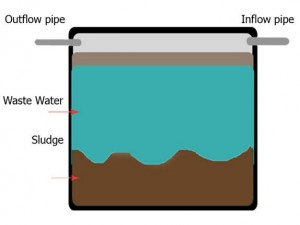A Column from the Door County Environmental Council
- Share
- Tweet
- Pin
- Share
Studies have shown that water-softener brine regeneration wastes not only harm the natural decomposition processes occurring in a wastewater treatment system, they can also cause the septic tank itself to discharge a greater concentration of solids, grease, and oil into the dispersal field.
Since the purpose of the tank is to separate the solids and fats, oil and grease from the liquid, discharging mostly dissolved organic matter and nutrients, any discharge of solids, fats, oil and grease will have a disastrous effect on the drainage field. The discharge of solids into the drainage field will cause the absorption soils to plug resulting in an expensive drain field replacement or repair.
Experiments with septic tanks have shown that a high concentration of salt introduced by slugs of backwash brine will cause salt stratification in the tank. The result is that the salt water dives to the bottom of the tank occupying space that is designed for the settling of heavier solids.
The heavier salt water can actually lift the sludge from the bottom of the tank, displacing it and washing it into the filter or solid dispersal field if no filter is present. Field observation of tanks with brine discharge shows that these tanks have not developed distinct layers of sludge, scum and a clear zone, a prerequisite for proper operation.
It is not necessary to discharge regenerate salt water to the wastewater stream. Some regulatory authorities classify the brine as salt-laden water, free of contaminants and able to be dispersed directly to a sump or infiltration chamber in a manner similar to roof runoff. In most cases, regeneration brine began as well water (groundwater) and is still considered groundwater with a heavy addition of sodium chloride (table salt). A simple by-pass, which conveys water softener brine discharge directly to the drainage field avoiding the septic tank, is permitted in many jurisdictions.
Check with your plumbing contractor and the county Sanitarian’s Office for information on the possibility of diverting your water softener discharge. Remember, here in Door County special considerations for groundwater protection are needed and mandated for our benefit. Consult with the proper agency and follow their recommendations.

